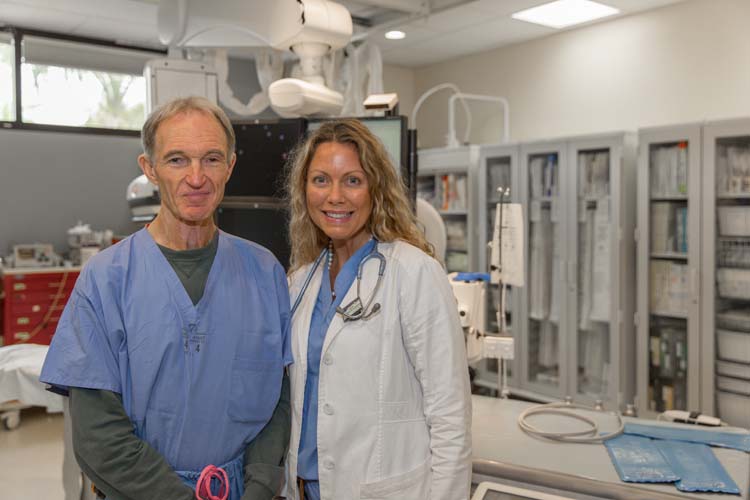
Interventional cardiologist Dr. Charles Croft of Melbourne and nurse practitioner Jennifer Konowitz of the Sebastian River Medical Center’s catheterization lab are operating on the cutting edge of modern medicine, having just started work on a worldwide clinical trial for the FDA-approved Cobra PzF cardio stent by CeloNova.
Stents are metal or plastic mesh tubes that, according to the American Heart Association, “help keep coronary arteries open and reduce the chance of a heart attack. A stent is inserted into the clogged artery with a balloon catheter. The balloon is inflated and the stent expands and locks in place. This holds the artery open and allows blood to flow more freely.”
Until it doesn’t.
Sometimes inflammation, cellular growth or fatty deposits can clog up a stent.
“The Cobra stent is a new kind of stent,” Croft says. “Normal stents are made with metal scaffolding and then a polymer coating; in the polymer is a drug to stop cells from growing into the stent and blocking it off.”
By contrast, the Cobra stent “is covered in an inorganic nanometer layer of a polymer that has certain characteristics. Number one, it stops inflammation, the cause of stents blocking off. Number two, it is antithrombotic, which means it stops blood [and fatty deposits] from sticking onto the stent and clotting it off.”
Another impressive quality of these new stents is their ability to radically reduce the amount of time patients have to be on blood thinners such as Plavix after the stent is implanted.
Croft says currently most patients must be on Plavix for six months after a stent is put in place, but this clinical trial hopes to show that timespan can be reduced to just two weeks.
“That’s what we’re hoping,” says the meticulous Croft, “and we’re hoping that the outcomes are going to be equivalent to, or better than, the traditional stents.”
If the trial yields positive results, it will be a game-changer, according to Croft. That’s because many patients are already on other blood thinners, such as Elequis or Xarelto, that don’t protect the stent from clotting, and have to take Plavix on top of the existing meds, which increases the risk of excessive bleeding.
If the Cobra clinical trial is successful, the device could cut the time patients need to take two blood thinners by more than five months, providing both a medical and emotional boon.
“If you know someone on these types of medications,” Konowitz says, “they tend to bruise easily and bleed longer, [and] they even worry about it when they’re not bruising or bleeding. Less time on the dual antiplatelet therapy for my patients would be a huge benefit.”
Of course, clinical trials need patients and getting into this trial starts with Konowitz.
“I telephone them and go through a fairly extensive history prior to them coming in, and then do a physical examination when they come to the cath lab,” she says. “If they are a candidate, I tell them everything about the study – the risks and the benefits. Then I ask them if they would like for us to give all the details to their primary care physician and their cardiologist. They always do and we much prefer that. After that, Dr. Croft speaks to them about the trial.”
If a patient is suited for the trial, he or she will find out fast.
Once Konowitz submits her interview and exam information to the study coordinator – located right in Croft’s Melbourne office – it takes mere seconds to determine the patient’s eligibility.
It’s entirely possible the data collected here on the Treasure Coast, as well as in Germany, France, Italy and other countries around the globe, will revolutionize cardio stent technology.
Dr. Croft’s offices are at 1402 Oak Street in Melbourne. The phone number is 321-722-3288. The number for Sebastian River Medical Center, where the cath lab is located, is 772-589-3186.



